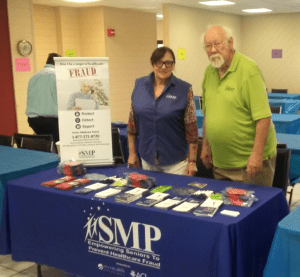Recently, Panter, Panter, & Sampedro sponsored the Senior Active Life Expo in the Village of Pinecrest, where managing partner,  Mitch Panter met Larry Dent, a 78-year-old Medicare beneficiary outreach specialist. Larry was at the event on behalf of the Senior Medicare Patrol (SMP), a national organization of trained staff and retired professional volunteers with the mission to educate seniors about how to avoid becoming victims of Medicare fraud.
Mitch Panter met Larry Dent, a 78-year-old Medicare beneficiary outreach specialist. Larry was at the event on behalf of the Senior Medicare Patrol (SMP), a national organization of trained staff and retired professional volunteers with the mission to educate seniors about how to avoid becoming victims of Medicare fraud.
It’s no secret that Medicare fraud is rampant in South Florida. Regular news headlines mention cases where healthcare providers or clinic owners are arrested and charged with defrauding unsuspecting beneficiaries and the government out of millions of dollars.
When fraud is directed toward innocent older adults on Medicare, it is particularly heartbreaking. South Florida is a hotbed for this type of crime mainly due to the nature of the population. Older adults can be extremely vulnerable to crimes when the criminal is someone in a healthcare setting who is threatening to take away healthcare benefits, or assuring them that they need services they may not actually need. Additionally, many of the seniors in our area come to South Florida from other countries and may also have language barrier issues that create an extra layer of confusion throughout a complicated healthcare process.
A History of Fraud
Until 1965 there was no safety net medical program for seniors. After Medicare was implemented in 1965, it was not long until unscrupulous criminals saw the vulnerability of Medicare to fraudulently bill. Over the years, the weight of serving some 50 million Medicare beneficiaries allowed scammers a perfect cash cow that kept on giving and giving. Medicare would accept invoices from licensed healthcare providers and pay the invoice quickly to provide cash flow and an incentive to providers. The flaw in this system was that it took Medicare auditors about three years to discover that Medicare had been billed fraudulently. Recovering stolen funds was almost impossible because scammers would bill continuously for several years. Medicare would pay but when the scammers knew that the feds were closing in they would simply disappear. Often, they would disappear back to Cuba, Russia, or other places where there were no extradition treaties. At present, the estimate of the amount of money stolen through Medicare fraud is over $60 billion annually.
The Senior Medicare Patrol
In order to address some of the issues of fraud impacting older adults, the SMP was created to form a national organization of trained staff and retired professional volunteers with the mission to educate seniors about how to avoid becoming victims of Medicare fraud. The SMP is part of the U. S. Administration for Community Living, which is ultimately part of the Department of Health and Human Services. The SMP is national in scope and grant funded, and grants are awarded on a competitive bid basis.
SMP’s Message to Seniors
The message of SMP is simple yet clear: Protect your Medicare number, social security number, and credit card numbers. Do not give out the numbers to anyone you do not trust. Do not talk with people who want your personal information. Hang up and report them on the toll free hot line number: 1-877-272-8720. There is no charge for the call, and no call is unimportant
Beneficiaries should also look closely to detect any irregularity in each statement of charges. Each beneficiary receives an explanation of benefits from Medicare or their Medicare Advantage program where they will be able to examine each charge on their Medicare account. If they see any charge that does not appear to be correct, they can call the toll free hot line number. Things to watch for are double billing, billing for procedures not done, or equipment not ordered by a physician. Of course, there may be honest mistakes, but these are easily corrected by calling the provider directly.
Local SMP presentations and brochures with information are available in both English and Spanish, and additional information is available in Haitian Creole. There is also a national resource library that can send information in a variety of languages.
New Medicare Cards, A New Way to Scam?
Medicare is now beginning to distribute new Medicare cards to all 59 million Medicare beneficiaries. Since its inception, Medicare cards have had the social security printed on the card. The Medicare number is the social security number plus an identifier. If a scammer can obtain the social security number, he or she may guess at the identifier and begin to bill Medicare. The new Medicare card will eliminate this possibility by printing a “Medicare Beneficiary Identifier,” which is computer generated and links the beneficiary to Medicare. All health care providers are prepared to accept the new card. The new Medicare card is absolutely free to the beneficiary.
One of the newest scams is to call the beneficiary and tell them that they owe money for the new card, they must pay immediately with a credit card, and failure to pay will result in the termination of the beneficiary’s Medicare benefits. The scammer will do anything to get credit card and bank information. The proper response is to simply hang up the call and report the call on our toll-free hotline.
 Larry Dent, SMP’s Outreach Specialist for South Florida
Larry Dent, SMP’s Outreach Specialist for South Florida
As the Outreach Specialist for Miami-Dade and Monroe Counties, Larry Dent takes the SMP message to all Medicare beneficiaries by attending health fairs, making presentations at senior centers, and by appearing on local media with his message. The grantee that he works for is EQ Health Solutions, with its headquarters in Baton Rouge, LA. Under the able leadership of Sonja Landry in the home office, EQ Health has not only been awarded the SMP contract for Louisiana, but also the SMP contract for Florida, Wisconsin, and Mississippi. To learn more about the SMP and Larry’s mission, you can visit the Facebook page for Senior Medicare Patrol-Florida, or web site is stopmedicarefraud.org
SMP’s South Florida Outreach to Homeless Seniors
Larry and the SMP of South Florida are also working with Gisela Bretones of “The Caring Place,” associated with the Miami Rescue Mission, to make sure that all seniors receive their new Medicare cards, including seniors who may be homeless. These most vulnerable on the streets often find out about benefits to which they may be entitled to by SMP efforts to refer them to the office of the local Ombudsman, the local security office, or another appropriate agency for assistance. A recent point in time survey of Miami homeless indicates that there may be as many as 5,000 seniors who spend their nights on the street. It would be a tragedy for a senior to be homeless with benefits to which they would be otherwise entitled to receive except for having no identification. Additionally, Larry and the South Florida SMP are partnering with the SMP director in Los Angeles in a joint effort to create a strong program of assistance for homeless seniors.
Larry’s passionate work through the SMP Outreach program is carried out at no charge to the community. He works closely with all the major networks and hospitals for health fairs and community events, including the Mayor’s Consortium for a Healthier Miami, Age Friendly Initiative, and several other networks provided by healthcare providers.
It’s clear that the SMP program is a valuable tool in the prevention and discovery of Medicare fraud that robs Medicare of funds that could be used to provide a wide range of much needed benefits to seniors. If you or anyone you know has been a victim of any kind of Medicare Fraud scam, please call the toll free hot line number at 1-877-272-8720 to report the fraud immediately.
At Panter, Panter, and Sampedro, we are committed to helping those in our community both through our work and through various outreach efforts. We are proud partners, sponsors, and advocates of a multitude of various community organizations, including those issues that affect seniors. We greatly respect and admire the work that Larry and the SMP program are doing, which is why we are proud to help them spread the word in protecting seniors against Medicare scams.


